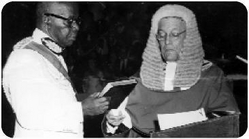Jamaica celebrates - Building Our Nation, Our Family, Our Home
Published: Sunday | June 21, 2009

The Hon A. R. Cools Lartigue, acting chief justice, administers the oaths to Sir Clifford Campbell (left) during his swearing-in as Jamaica's first native Governor General in November 1962.
The attainment of constitutional indepen-dence, according to some, did not usher in any significant new changes in Jamaican life.
Admittedly, independent status did bring with it additional responsibilities, notably in regard to the local control and manipulation of foreign relationships.
Income in Jamaica was very unevenly distributed, with 10 per cent of the population enjoying almost half of the national income.
The control over the corporate business sector was vested in a small group of 21 families.
The failure of the agricultural sector of the economy to engender development, and the increasing alienation of locally owned land by the newly arrived bauxite companies set in train a rural-urban migration. In 1943, for example, 19.26 per cent of the total population resided in Kingston and St Andrew. By 1960, this figure had risen to 26.06 per cent and in 1970 had risen to approximately 30.5 per cent. The net effect was the creation of a massive urban conurbation plagued with unemployment and debilitating social conditions.
- Extracted from Jamaican Elites: 1938 to present by Peter Phillips - Essays on Power and Change in Jamaica edited by Carl Stone and Aggrey Irons - Department of Government, February 1976
The real value added for Agriculture, Forestry and Fishing industry during 2008 declined by 5.1 per cent. Its contribution to overall GDP was 4.8 per cent.
Today, the urban population of Jamaica is 52 per cent. The data paint a picture of urban stagnation in Kingston and St Andrew and to a lesser extent Montego Bay, and to a rural population which continues to be stable at about 48 per cent of our total population.
In 2008, the Salary and Benefits Survey for Executive, Managerial, Supervisory, Technical, Professional, Clerical and Hourly-rates Staff was conducted by the Jamaica Employers' Federation. It was found that in the management category, the highest salary reported was $23.6 million for a managing director, and the lowest was 4384,0000 for a client services manager. In the non-management cacategory, the highest salary was $4.9 million for an internal auditor and the lowest was $103,000 for a janitor. These were outside of allowances.
- The Survey of Living Conditions 2008 - Planning Institute of Jamaica.
The relative stagnation of our urban population is connected with the long-standing stagnation of our national economy. What these population data reflect is the collapse of our efforts to develop a significant local manufacturing sector, following the rise of North American Free Trade Agreement and competition from Asia and also Central America. As employment opportunities have drastically declined in Kingston in particular, the population, which up until 1980s was streaming into the Corporate Area, got the message. What was the point of leaving one's rural district in which at least one could likely live rent free and have food to eat, to turn into a beggar in Kingston, cotching in some 'tattoo'? - Professor Don Robotham Truth be told, King Sugar had long ceased to be the driving force of Jamaica's economy, having been overtaken in the 1950s by rapidly expanding import substitution-based manufacturing and the bauxite industry. But sugar output was still increasing up to the mid-1960s, though by 1967 it had fallen to 414,000 tonnes, from over half a million tonnes or by nearly 20 per cent just shortly before. By 1980, it was struggling to reach 200,000 tonnes, or half the 1967 level, and sank to an unimaginable 120,000 tonnes by 2005 crop year. - Dennis Morrison
If you: ✓ Were born in 1962 ✓ Got married in 1962 ✓ Got your first job in 1962 ✓ Graduated from school in 1962; or, ✓ Had any other significantmilestone in the year of Independence, then you belong to the Class of 1962. Tell us your story and send your photographs … to Jamaica Celebrates - Building Our Nation, Our Family, Our Home; editorial@gleanerjm.com, or mail them to Kerry-Ann Hepburn, Jamaica Celebrates, The Gleaner, 7 North Street, Kingston. You may also log on to our website at jamaica-gleaner.com for more information, or call Kerry-Ann Hepburn at 922-3500, extension 6419.


